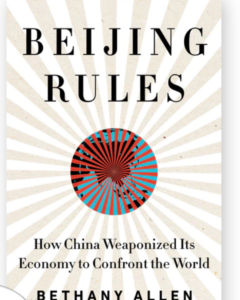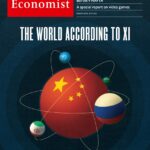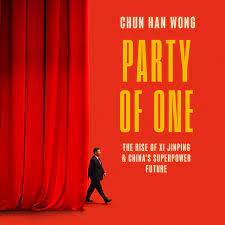On a host of fronts, China’s domineering leader seems to be fighting fires, The Post’s Ishaan Tharoor observes:
Abroad, President Xi Jinping is confronted by a hardening consensus against Beijing in the West, as well as ever-present friction with regional powers and neighbors. At home, Xi presides over a hinge moment for the Chinese economy. Its meteoric growth has slowed, a brief post-pandemic surge petered out, and analysts point to profound structural issues undermining China’s future prospects…Xi’s ever-tightening authoritarian grip over virtually all facets of life in China is arguably making the situation worse.
 “The government’s pursuit of total control has set the country on a path of slower growth and created multiplying pockets of dissatisfaction,” wrote Ian Johnson, a senior fellow at the Council on Foreign Relations.
“The government’s pursuit of total control has set the country on a path of slower growth and created multiplying pockets of dissatisfaction,” wrote Ian Johnson, a senior fellow at the Council on Foreign Relations.
The cumulative effect of successive inflection points has been to strengthen the position of the West’s enemies and weaken the capacities and will of many in the West, notes Joseph Bosco, a former China country director for the secretary of Defense. If U.S. will to defend Taiwan remains as opaque as it is under the policy of strategic ambiguity, and as dilatory as it has been in helping Ukraine, China will continue to press its advantage until strategic miscalculation brings the world to perhaps the final inflection point, he writes for The Hill.
“Nobody can challenge [Xi] politically,” Ling Chen, an assistant professor at the School of Advanced International Studies at Johns Hopkins University, told The Post’s Christian Shepherd. “But economic performance is always the very core of the regime’s legitimacy and that affects how well he can govern the country.”
 U.S. investors should be wary of the growing threat posed by China’s authoritarian capitalism, says Stone Washington, a research fellow with the Competitive Enterprise Institute’s Center for Advancing Capitalism. Since the CCP’s founding in 1949, China’s primary goal has been to displace the United States as the predominant global superpower.
U.S. investors should be wary of the growing threat posed by China’s authoritarian capitalism, says Stone Washington, a research fellow with the Competitive Enterprise Institute’s Center for Advancing Capitalism. Since the CCP’s founding in 1949, China’s primary goal has been to displace the United States as the predominant global superpower.
Undermining America’s economic interests is paramount to achieving that goal. China’s authoritarian system of capitalism poses a significant threat to economic freedom, undermining the liberties associated with America’s market-driven economy. U.S. investors — both traditional and ESG — must wise up, Washington writes for National Review.
But the Chinese threat is geopolitical and ideological, not economic, argues analyst Jonah Goldberg. Constraining China’s access to sensitive technology and buttressing alliances in the region is necessary not because of China’s money, but because of what the Chinese regime wants to buy with it.
 Managers and business executives in state-run companies are compelled to study and expound upon the virtues of “Xi Thought,” in a nod to the more doctrinaire, Maoist past. For Xi, centralized authority and control is paramount. That reflects Xi’s weakness, The Post’s Tharoor adds.
Managers and business executives in state-run companies are compelled to study and expound upon the virtues of “Xi Thought,” in a nod to the more doctrinaire, Maoist past. For Xi, centralized authority and control is paramount. That reflects Xi’s weakness, The Post’s Tharoor adds.
“Whereas Mao Zedong and Deng Xiaoping enjoyed prestige from their revolutionary pedigree and exploits in establishing the ‘New China,’ Xi has no personal legitimacy independent of the Communist Party,” Chun Han Wong, author “Party of One: The Rise of Xi Jinping and China’s Superpower Future,” said in a recent interview. “His right to rule is inextricably linked with the party’s legitimacy, and his power cannot be separated from the party’s political machinery.”
By tying profits to political acquiescence, the Chinese Communist Party is forcing companies and governments around the world to accept its rules, the National Endowment for Democracy’s International Forum adds. The coronavirus pandemic marked the first time that the Party deployed its tool kit of economic coercion on an issue directly related to the health and well-being of quite literally every person in the world. But Western democracies aren’t helpless victims in Beijing’s game. The West created the conditions for the rise of authoritarian capitalism by divorcing political values from market structures.Written by one of the first American journalists to expose China’s covert influence operations in the United States, Beijing Rules includes headline-making stories of Western institutions bowing to Beijing’s pressure. Please join the International Forum for a discussion with Axios journalist Bethany Allen and Journal of Democracy editor Will Dobson to discuss her book and the wider implications of China’s international economic coercion.
Xi’s ever-tightening #authoritarian grip over virtually all facets of life in #China is arguably making the situation – at home and abroad – worse, @washingtonpost‘s @ishaantharoor observes. https://t.co/IOkQFVSIdc
— Democracy Digest (@demdigest) September 5, 2023







